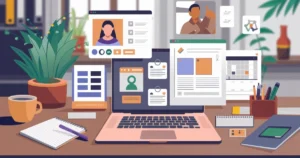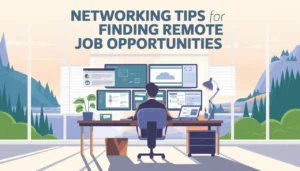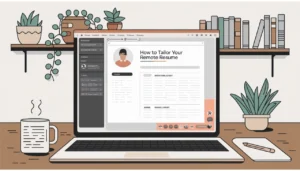Remote work has evolved the job market, providing people with flexibility and broadening opportunities for talent around the world. Hiring companies through remote work forces job seekers to master and prepare for specific dynamics of a remote job interview. The dynamics of remote job interviews can be much more diverse compared to classical in-person interviews, so it calls for special skills and preparation. This post prepares you with actionable tips and strategies on how to successfully make one’s way through the process of a remote interview. Understanding the challenges as well as those particular opportunities of a remote interview will help you stand out and increase your possibilities to win that dream job.

1. Prepare Your Tech Setup
One of the requirements to ace your remote interview is a glitch-free setting. Since you will be interviewing virtually, making sure all things are well going to make all the difference on how you present yourself during the interview.
Internet Connection
Start with checking your connection if you have a stable internet service. A slow or unstable connection may cause problems with disruptions, which would give the wrong impression to the interviewer that you are unprepared or even unprofessional. You can use online tools such as Speedtest.net to check on your internet speed. For downloads, minimum of 25 Mbps. For upload, the minimum should be 5 Mbps. In case your connection is unstable, direct Ethernet will serve you better than Wi-Fi. Actually avoid peak time in the house. For example, browsing during early morning or late night when nobody expects any internet use as interference. Choose the Right Hardware
The quality of equipment can make the interview worthwhile.
High-definition cameras and good-quality microphones make a big difference in audio, and while several laptops tend to come with cameras and mics, these generally aren’t the best quality. An outside camera will give you the professional look you want, and an outside microphone will capture your voice clearly, without any background noise.
More than this, headphones can decrease audio feedback and provide the best quality of audio. Besides, it will not only make communication excellent but show that you take the interview seriously.
Get Familiar with the Interview Platform
Now-a-days, different companies use different platforms for remote interviews. Some like Zoom, others like Skype, and others prefer Microsoft Teams; so before appearing for an interview, you need to know which software the person interviewing you uses. Download whatever is the necessary software, and if required register for an account in advance.
Try out features like screen sharing, mute options, and chat functions so that you are comfortable with them in the interview. Do a mock interview with your friend or family member so you can really master the use of the platform and work on potential problems that may arise.
With these steps – a good, steady internet connection, good equipment, and getting used to the interview platform – you are sure to make a formal atmosphere that will give you all the elbow room to display your potential as well as your personality. It can thereby reduce stress to give your best impression, even on a remote interview.
Create a Professional Environment
Creating a professional atmosphere for your tele-job interview is important in making the right impression. A good set-up will beautify you while allowing you to convey seriousness and professionalism.
Select the Right Background
Start by selecting a suitable background. As per requirement, the best background may be a clean and untangled space that does not distract the interviewer while speaking. Light grays, beiges, or whites will make your background look very relaxed and professional. Any very busy patterns or bright colors can be extremely distracting to the view. If the area you are working in is not good for the ideal background, consider using a virtual background option through many video conferencing services; just make sure it’s professional and does not distract from your message.
Also pay attention to what is in the backdrop. Take away anything personal or distracting, such as laundry, dishes, posters from the college basketball game, etc. Ideally you want to shoot against a clean wall or then use a bookcase lined with books to add a scholarly veneer without overwhelming the composition.
Lighting and Sound Considerations
Lighting makes a huge difference in how you look on camera. Natural light is always the best, so try to turn your chair towards a window so that daylight falls on your face and warms the environment up. Softbox lights or ring lights will give you a soft light that’s not harsh at all. Those overhead lights are really treacherous-they leave those silly shadows on your face.
Good sound quality, apart from light, is essential for noise-free communication. Get a quiet room whereby you won’t be disrupted. If it’s a noisy house or noisy street area, you can get around this problem by closing your windows or using big curtains. You may also inform the others that you are in an interview so that the disruption becomes minimal. You can also listen to your background noise and ensure your voice is clear with headphones that have an inbuilt microphone.
These and other considerations not to let sound distractions distract- create a professional environment where you focus on the interview as such. It would have been wrong to neglect such details. It shows that you are really prepared, but above all, it shows you are keen on making a good impression.
Research the Company and Role
Research the company and the specific role for which you are interviewing. This is essential to a successful remote interview. It goes beyond preparing you so that you can tailor your responses; it demonstrates that you’re really interested in the position.

Know the Company Culture
Start with the culture; this is where you learn about how you would fit into their team. Thus, you need to browse the company’s website and look at information regarding the mission, values, and vision of the organization. Be sure to pay attention to such sections as “About Us,” “Careers,” or “Our Team” since they usually feature the essence of the company’s priorities and its working environment.
Utilize the company’s social media to explore it. Go through the LinkedIn page, the Twitter account, and other lines of communication. Take note of how the team engages the audience. Think about posts that highlight the achievements of the team, employee recognition, or participation in the community. Such pieces of information give you an idea about the people, that is, the culture of the company.
Apps such as Glassdoor and Indeed contain employee reviews which give an idea of the place. Though opinions are subjective, patterns in the feedback will help you gauge better about the overall work environment, management culture, and the level of employee satisfaction in a company. That’s how you can align your response with what they value in an interview.
Know the Job Description Inside Out
Equally important is to know what specific role you are applying for. Read the job description very carefully to find key responsibilities and essential skills. List the main tasks and requirements there. This will equip you well to prepare for questions about your aptitude for the job and also give an opportunity to share experiences from your own background that may be relevant.
Think about how your skills and past experiences are likely to support the needs of the position. Prepare examples of illustrations of your qualifications, that might have resulted from projects you completed, issues you overcame, or accomplishments that demonstrate your capabilities.
Make sure you’re familiar with technical skills, types of software, and computer languages that are being mentioned in the job description. For instance, if you are required to be proficient in tools like Slack, Asana, or specific programming languages, ensure that you have been able to talk freely about your level of experience.
Pre-interview preparation, which basically includes extensive research into a company culture and details of the job description, makes you a better-informed candidate. Pre-interview preparation will also make you answer questions much better but also let you ask thoughtful questions that prove interest in the position and the organization.
Practice Common Interview Questions
Common interview questions have to be prepared for in order to acquire confidence and respond appropriately about qualification. Interviews include a mix of behavior as well as role-specific questions. Once you know how to answer them, it will make a huge difference in your performance.
Behavioral Questions
Behavioral questions try to understand how you handled previous situations. They reveal much regarding how you problem-solve, work in a team and adapt to situations. One approach that most people use to organize their answers is the STAR model which is abbreviations for Situation, Task, Action, and Result.
Situation: Describe briefly the context or background of a specific incident with which you were faced.
Task: Describe the task or challenge that you were required to deal with in that situation.
Action: What did you do?
Result: What happened as a result, or what can you measure or learn from this experience?.
For example, if you were asked when you successfully managed to resolve a dispute with a colleague, you could describe a situation in which a project deadline was at risk. You would detail your involvement in the project (Task), explain how you successfully opened up a discussion in order to understand the conflicting views better (Action), and conclude by considering how successfully you can manage to resolve it and complete the project on time (Result). It is highly possible that you can be prepared for different behavioral interview questions by using multiple scenarios based on the STAR method.
Role-Specific Questions
In addition to these behavioral questions, you should prepare role-specific questions that are directly related to the skills and responsibilities that are outlined in the job description. Such questions help show technical expertise and experiences relative to the position.
Get ready to crack the job description and become vigilant about the key skills and tasks. For instance, if the job demands project management experience, have your projects in mind with regard to experiences you gained from them. Try to recall some instances where you applied any tool or methodology applicable, such as Agile or Scrum, and present examples of how they added success to those projects.
Also, if your role will involve working with customers, look for instances that demonstrate effective communication and how you managed challenging customers or simplifying processes to enhance your service.
Hypothetical cases are also part of the role-specific questions. You may be challenged on how you would handle a particular project challenge. To do so effectively, you must draw upon your past experiences and your knowledge of the industry to give a thoughtful answer.
It will prepare the candidate to communicate his qualifications and prove his suitability for the role for both behavioral and role-specific questions, hence building confidence and facilitating a more meaningful engagement with the interviewer.
Showcasing Remote Work Skills: Emphasizing Communication, Time Management, and Self-Motivation
In the dynamic context of remote work, important skills such as communication, time management, and self-motivation need to be demonstrated to thrive in a remote set-up. Each of these skills is sure to promote the ability to thrive within a flexible work context and maintain all the goodness about productivity and professionalism.
Clear and Effective Communication Skills
The most important skill for working remotely is clear and effective communication. In a world of limited personal contact, the ability to voice one’s thoughts, ideas, and tasks through written and verbal communications is just part of the required skill set. An example would be I make sure my emails and messages are concise yet detailed enough for others to clearly know where one stands without needing additional clarification. Preparations are done beforehand with all the available talking points, which will not allow the occurrence of miscommunications and make sure discussions stay on focus and productive. Using tools, such as Slack, Microsoft Teams, or Zoom, I am able to keep myself on task and responsive while creating a transparent and collaborative working relationship with the team.
Emphasis on Time Management: In work settings, it means handling multiple tasks within given timeframes to meet deadlines without constant supervision. As a motivation booster for keeping on track, I use Trello, Asana, and Google Calendar to monitor day-to-day organization, keep working based on priority, and set far-reaching goals. The larger projects are broken up into smaller tasks for constant progress, though reviewing my schedule regularly offers the flexibility if needed. I also follow the Pomodoro technique while doing projects-in short focused sprints followed by quick breaks-to prevent burnout and maintain high energy levels.
Self-Motivation and Productivity while Work-Ing Remotely
Self-motivation or keeping oneself active while working remotely is necessary. I always keep myself task-oriented so that I would set daily goals and be accountable to myself for checking on whether I have accomplished them. Well, since my workspace is decluttered, free from disturbances and distractions, so I can focus wholly without interruptions. I do keep myself relatively mindful, not forgetting to take regular breaks in order not to lose my mental sharpness. With a much greater picture in my mind and what I do would have an impact, that drives me to at least reach a certain level of performance despite physically being away from the rest of my team.
Dress for Success in Remote Work: Choosing Professional Attire for On-Camera Presence
Dressing for success happens to be key in any remote work setup. This behavior will define the perceptions of you in virtual meetings, interviews, or conferences. The convenience of working from home may at times entice you into dressing down, but a professional appearance on camera builds up your credibility, increases your confidence, and tends to boost general performance.
Selecting Professional Attire
Even when working from home, you should still dress similarly to what you would have presented if it were an in-person interview or an office setting for projecting a professional image. Wear whatever is professionally appropriate according to the nature of the role, company culture, and the nature of the meeting. A button-down shirt, blouse, or blazer will be safe bets when you need to dress formally for a business meeting, interview, or presentation. At the same time, smart-casual clothes – say, a neat sweater or a collared shirt – show professionalism while being comfortable, suitable even for regular team meetings or more casual interaction.
Dressing correctly not only shapes how people view you but also shapes how you feel and perform. In fact, research has shown that wearing professional wear increases confidence, concentration, and productivity-even from a distance. Putting on clothes that feel polished and work-appropriate takes the time necessary to start the day off on a positive note.
Upper Body Focus for On-Camera Presence
Video conferencing can be quite merciless to the torso because the camera does not take in any of it. Thus, you need to pay extra care in choosing your clothes. Also, choosing very simple neutral colors besides patterns and bright colors can easily bring in distraction in the video conference. A clean-cut shirt and a neat blouse with neat hair-do make sure that there is absolutely no mess about the person’s appearance. For example, while tops of tees or hoodies are quite informal, their wear can be an expression of not being in the right mindset or mood. Although the off-camera comfort is important, wearing pajama bottoms and sweatpants might impact your mindset. Wearing complete professional uniform-even if partially exposed-places you mentally within the “work” mode, thus making the general performance and being ready at any moment when someone needs to stand up.
You are sure to dress in a way that balances being professional with being comfortable, so you look put together even while working from home.
Engage with the Interviewer: Essential Techniques for Making a Strong Impression
Engage with the interviewer as much as possible to connect and make a good impression during virtual or in-person interviews. Showing active engagement through eye contact, body language, and listening skills conveys that you pay attention, are confident, and actually care about what is being discussed.
Eye Contact
Building Eye Contact
Virtual interviews can be challenging to maintain eye contact, but that’s key to building rapport. While in a face-to-face interview you cannot help but look at the interviewer’s face, you will have to pretend to look at the camera in a virtual interview setting in order to mimic the eye contact. It would be more natural to look right at the screen where the interviewer will appear; however this would give the illusion that you are looking away. Position your camera at eye level and look right into it so that you can speak or listen. This makes the interviewer feel like you are completely present and interested in the conversation.
Eye contact shows that you are confident and attentive; it means you’re not sidetracked; you value the person you are talking to. If it intimidates you at first, look into the camera during mock interviews or video calls to your friends to make the movement more natural.
Active Listening Techniques
Active listening is not just a matter of hearing the words of the interviewer, but should also bring out proof that you’re fully processing and engaging with what he or she says. Be employing active listening strategies while attending the interview for you to appear more thoughtful and engaged.
One good strategy is to nod slightly as the interviewer speaks. This non-verbal cue will convey that you’re paying attention to what’s going on in the conversation. But don’t fall into the trap of overdoing it; though a couple of strategic nods can be an excellent indicator that you’re indeed interested in what they have to say.
Paraphrasing is another good skill. Just after the interviewer explains some point or asks a question, take one line summarizing what you felt he said before answering. Example: So, if I am correct, you are seeking a person who can manage clients and lead new projects, right? End.
Another form of interest can be expressed by asking clarifying questions. If you don’t get something, ask for clarification. “Could you explain the team structure?” or “How might this role be challenged?” shows you are really thinking about it and would like to know everything about the position.
Combining Verbal and Non-Verbal Cues
Verbal and non-verbal cues are most powerful together. Eye contact linked with active listening through nodding, paraphrasing, and questioning leads to a vibrant interaction that shows confidence and real interest in the topic. Occasionally smile and be relaxed and open, so the interviewer feels at ease and a pleasant environment has been created.
Mastering these skills will also make you stand apart not only as a brilliant communicator but as an active conduit with others – an important quality in any professional environment.
Prepare Questions for the Interviewer: Showcasing Interest and Ambition
If you prepare thoughtful questions to be asked of the interviewer, you show interest in the job and the company. It shows you have done your research and are invested in your future in the organization and want to ensure that opportunity serves your career interests. You’ll also get an idea about the culture of the company and its team dynamics and growth opportunities as well.
Showing interest in the role and the company Not only do you show that you are interested in the role, but also at what the organization does and how you might fit into it. This question about the goals of the company, team dynamics, or remote work policies can really help you to have a deeper understanding of how you will probably collaborate with your future colleagues. A question such as “Can you tell me more about how the team collaborates, especially in a remote setting?” shows you have interest in the practical life of the job and want to know how you would help the team succeed.
For example, when questioning the company’s goals in the short-term and long-term, you are really interested in the bigger picture. You would ask, “What are some of the company’s key priorities in the next year and how does this role contribute to achieving those goals?” This way, you prove you are really and truly interested not just in your day-to-day responsibilities but also as concerned with the strategic direction of a company.
Remote work policies are very relevant nowadays. In case the role is remote or hybrid, you can ask about the company’s expectations about flexible work arrangements and its ability to advance, and that will indicate the level of flexibility you might have. For instance, the question could be: “What are the company’s expectations for remote work and how do you ensure collaboration and engagement among remote team members?”.
Ask about Growth Opportunities
Among the very important questions you would ask would be a series of those opportunities for growth and development, advancement. Companies value those people who are growing, eager to learn, ready to advance in any organization in return for good employees. Asking about these opportunities would give an image to the interviewer about your ambition for long-term success.
For example, you might ask, “What opportunities for professional development and training exist within the company?” This tells the interviewer you are interested in building your areas of skill and wanting a firm that will support your development. Asking, “What are typical paths of career growth with this firm?” will give you insight on how talent gets fostered within the organization and where there may be room to grow with the role.
You may also like to know if the organization has any mentorship support systems in place for its employees. A question such as, “Are there any mentorship programs or annual performance reviews to help guide career development?” demonstrates that you want feedback and growth opportunities with the company.
Prepare Questions for the Interviewer: Showing Genuine Interest and Seeking Growth
A well-set-of thoughtful questions going into the interview also shows that you genuinely are interested in the role and actively thinking about how you would fit within the organization. Insensitive questions have the added benefit of helping a candidate gather critical information from the interviewer with regard to whether the company’s values and career aspirations align.

Demonstrate Interest in the Job
This can be through asking about team interaction dynamics, company goals, and indeed policies on working from a remote source. For instance, you might ask how the team works together when working remotely or what the key goals of the company are for the following year and how this role would be supporting those goals. It shows you are not only interested in learning about how you would fit into the team but also the bigger picture through your work.
As remote work is becoming the new trend, asking what the company thinks of working remotely or working from home will show a great interest in whether the role fits your lifestyle and preferences for how you want to work. For example, “How does the company support its remote workers and ensure team engagement?” would show an impressive proactive approach to getting into the company culture.
Ask About Growth Opportunities
Questions about opportunities for growth will place you in front of the interviewer as ambitious, which always makes a great signal to any hiring manager. Request information about opportunities in professional development, training, and career advancement
within the company. You may ask:
“What opportunities are there for career development in this role?” or “Is there a mentorship program that employees stay enrolled in as well as general training that employees continue to learn and become better at?” Your requirements make known your desire to find a role which will give you the opportunity to learn and develop, but also point to the company’s interest in the growth of employees.
You can prepare thoughtful questions to leave a lasting impression and gain more insights into the role and company.
Following Up After the Interview: Strengthen Your Candidacy
Post-interview follow-up is one of the critical steps in the process of employing people that one could respond to all questions that arise during the interview that would affirm his interest in the position and may engrain a strong impression about a candidate’s positive image. A thank you email would elicit gratitude, review the interview, and supply information that was not well covered during the interview.
Send a Thank-You Email
Within a day of the interview, follow up with a personalized thank-you email to the interviewer. Ideally, this should be done in the first 24 hours following the interview. In the message, let the interviewer know how much you appreciate the chance to discuss the position and thank them for their time in speaking with you. This will show your professionalism and thoughtfulness and will set you apart from other candidates. A simple opening like, “Thanks for taking your time to meet with me today. I enjoyed the conversation and learning more about the role and the company,” can go a long way in reinforcing your positive attitude.
Reiterate Key Points and Thank Them
In your follow up email, reiterate some points discussed during the interview. For example, be high on anything that you would like to have heard regarding the job. Mention how you think your skills align perfectly with the company’s goal. This way the interviewer could regain the inkling of how enthusiastic you were for the position and how well you fit. A sentence like, “I’m especially excited about the opportunity to contribute to your team’s innovative projects and further develop my skills in [specific area],” reinforces your interest and keeps you top of mind.
Restate Your Interest in the Role
End by restating your desire for the job and expressing gratitude to the interviewer one more time. If there is one thing you have been thinking of but didn’t manage to say in the course of the interview, now is the time to voice it. You could say: “I thought after our interview that I had forgotten to share my experience with [specific skill], which I think would particularly apply to this job.”
Conclusion: Embrace Remote Interviews as a Path to Success
In general, remote interviews open up plenty of opportunities for candidates to showcase their flexibility, good communication skills, and professional approach in virtual environments. The takeaways in that respect include maintaining eye contact by focusing on a camera, listening attentively and interacting with the interviewer, dressing professionally for on-camera presence, and preparing thoughtful questions that will indicate their interest in the role and company.
Rumi interviewed me over the phone. It’s another excellent chance to shine with talent and fit into the new face of work. Of course, proper preparation and confident communication can create lasting impressions by differentiating you from anyone else.
We would love to hear from you! How have you fared recently in a remote interview? Which tactics did you find most useful, and what would you do differently if you had the opportunity again? Let’s share your tips or any questions you might have in the comments below-your expertise can indeed be the difference between success and disaster for others seeking to make it through a remote interview!
Call to Action: Share and Subscribe for More Career Tips
If you think that post was useful, don’t keep it to yourself, please share it with other job seekers in your circles who will appreciate these amazing remote interview tips! Unlike us who are just learning the ropes of remote interviews, there are also experts who have mastered this art perfectly and all of us have various things that one can contribute that can assist others performing such interviews. By doing so, you may be making it possible for someone to get the position they have always wanted.
Want more inspiration on how to grow your career, job search, or help yourself work more effectively from home? You can conveniently take advantage of the subscription feature to our newsletter! You’ll get informative materials sent to you to ensure that you don’t lag behind in the current workforce dynamics. No matter whether it is getting ready for the interview, learning new strategies on how to be focused or improving on other aspects of one’s life, we have the trends and practical information you need in order to promote your career.
So, hit that subscribe button and stay in touch with us! We will provide you with the essential support you need during your career, to ensure it is a fulfilling one. And remember… sharing is caring, so anyone who has information should pass it on, let us enable more individuals in the job market to conquer their fears and find employment in remote positions.
FAQs: How to Ace a Remote Job Interview
What To Wear For A Remote Job Interview?
It doesn’t matter that it’s remote; good dressing is still a must. Professional or business-casual clothes would reflect the company culture. Concentrate on neat, well-fitting clothing, especially on the upper body part, as that’s all most people can see on camera.
How to make a good impression in a remote interview?
Make sure the room is quiet, well-lit, and free from distractions. Test the technology for the interview-including the internet connection, webcam, and microphone-baseline before the interview so that you can avoid technical difficulties at the worst time.
What do you say to good questions from the interviewer?
Ask about the team dynamics, goals of the company, remote work policies, and growth opportunities in the organization. You can ask them about the onboarding process, how they measure performance, and their vision for the future.
How to follow up after a Remote Job Interview?
Email with thanks within 24 hours: write, thank you again for your time summarizing the things you mentioned that you are interested in this role. While reiterating the interest in the role, you may also mention any other information that you may have wished to disclose during an interview.
How to prepare for a remote job interview?
Research the company, read over the job description, and prepare to answer common interview questions. Ensure that your technology works properly and have a mock interview done so that you grow comfortable with the virtual format.







